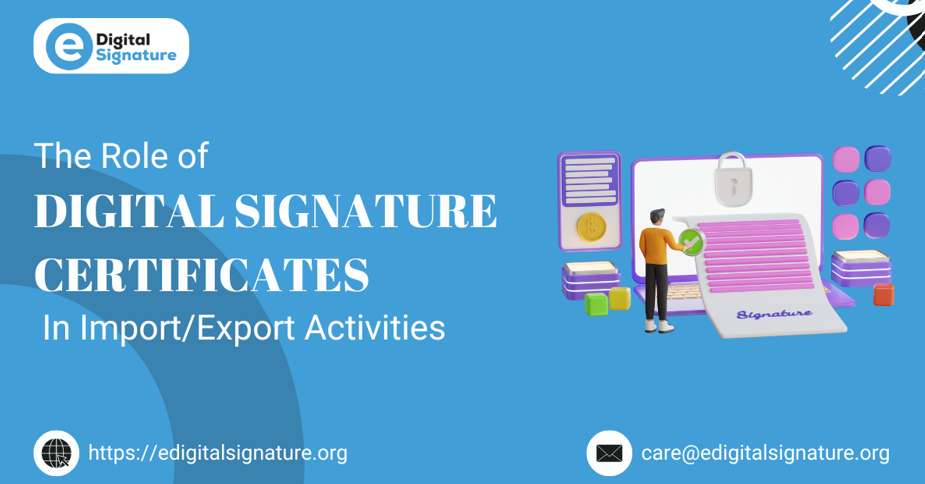Digital Signature Certificates (DSCs) have revolutionized the way businesses handle international trade, making import and export processes more efficient, secure, and legally compliant. As global trade becomes increasingly digitized, the role of DSCs in streamlining transactions and ensuring data integrity cannot be overstated. This article explores the various aspects of DSCs in the import/export sector, including their benefits, applications, and the regulatory framework that supports their use.
Understanding Digital Signature Certificates (DSCs)
A Digital Signature Certificate (DSC) is an electronic form of a signature that authenticates the identity of the sender of a document. It is issued by a certifying authority (CA) and serves as proof of the individual’s identity. DSCs use public key infrastructure (PKI) technology, which involves a pair of keys – a public key and a private key. The private key is used to create the digital signature, while the public key is used to verify it.
Benefits of DSCs in Import/Export
Enhanced Security
One of the primary advantages of using DSCs in import/export is enhanced security. Traditional paper-based signatures are vulnerable to forgery and tampering. In contrast, DSCs provide a high level of security by ensuring that documents are signed and transmitted securely. The use of cryptographic algorithms ensures that the information is encrypted and can only be accessed by authorized parties.
Authentication and Non-Repudiation
DSCs authenticate the identity of the signatory, providing assurance that the person signing the document is who they claim to be. This is particularly important in international trade, where transactions often involve multiple parties across different jurisdictions. Additionally, DSCs offer non-repudiation, meaning the signatory cannot deny having signed the document. This is crucial for maintaining trust and accountability in trade transactions.
Legal Validity
In many countries, DSCs have the same legal standing as handwritten signatures. For instance, the United States’ Electronic Signatures in Global and National Commerce (E-SIGN) Act and the European Union’s eIDAS Regulation recognize the legal validity of electronic signatures, including DSCs. This legal recognition ensures that digitally signed documents are admissible in court, providing legal certainty to importers and exporters.
Cost and Time Efficiency
The use of DSCs significantly reduces the time and cost associated with handling physical documents. Traditional methods of signing and sending documents involve printing, mailing, and waiting for delivery, which can be time-consuming and expensive. DSCs enable instant signing and transmission of documents, leading to faster processing times and reduced administrative costs.
Environmental Impact
By eliminating the need for paper-based documentation, DSCs contribute to environmental sustainability. The reduction in paper usage not only saves trees but also reduces the carbon footprint associated with printing, mailing, and storing physical documents.
Applications of DSCs in Import/Export
Customs Documentation
One of the key applications of DSCs in the import/export sector is in customs documentation. Importers and exporters are required to submit various documents to customs authorities, such as bills of lading, commercial invoices, and packing lists. DSCs ensure that these documents are signed and submitted electronically, speeding up the customs clearance process and reducing the risk of errors and fraud.
Trade Agreements and Contracts
Trade agreements and contracts between importers, exporters, and other stakeholders often require signatures from multiple parties. DSCs facilitate the electronic signing of these agreements, ensuring that all parties can sign the documents quickly and securely, regardless of their geographical location. This is particularly beneficial for multinational corporations that operate in multiple countries.
Electronic Data Interchange (EDI)
Electronic Data Interchange (EDI) is a critical component of modern supply chain management, allowing businesses to exchange documents electronically in a standardized format. DSCs play a vital role in EDI by providing secure and authenticated electronic signatures for documents such as purchase orders, invoices, and shipping notices. This enhances the efficiency and reliability of the supply chain.
Regulatory Compliance
Many countries have specific regulations and guidelines regarding the use of electronic signatures in trade. DSCs help businesses comply with these regulations by providing a secure and legally recognized method of signing documents. For example, in India, the Foreign Trade Policy mandates the use of DSCs for various trade-related applications, including the filing of import/export declarations.
Banking and Financial Transactions
Import/export transactions often involve complex financial arrangements, including letters of credit, bank guarantees, and trade finance agreements. DSCs are used to sign and authenticate these financial documents, ensuring that they are securely transmitted and legally binding. This reduces the risk of fraud and enhances the trust between trading partners and financial institutions.
Regulatory Framework for DSCs in Import/Export
The regulatory framework for DSCs in the import/export sector varies by country, but there are several international standards and agreements that facilitate their use.
International Standards
The International Organization for Standardization (ISO) has developed several standards related to electronic signatures and DSCs, such as ISO/IEC 27001 for information security management and ISO/IEC 14533 for digital signatures. These standards provide a framework for the secure and interoperable use of DSCs in international trade.
National Regulations
Many countries have enacted laws and regulations to govern the use of electronic signatures and DSCs. For example, the United States’ E-SIGN Act and the European Union’s eIDAS Regulation provide legal recognition for electronic signatures, including DSCs. In India, the Information Technology Act, 2000, and the Foreign Trade Policy provide the legal basis for the use of DSCs in trade-related applications.
Trade Agreements
International trade agreements often include provisions related to the use of electronic signatures and DSCs. For example, the United States-Mexico-Canada Agreement (USMCA) includes provisions for the recognition and use of electronic signatures in trade transactions. These agreements facilitate the cross-border use of DSCs, promoting efficiency and trust in international trade.
Also Read, Digital Signature Certificate for Income Tax
Conclusion
Digital Signature Certificates (DSCs) have become an integral part of the import/export sector, offering numerous benefits such as enhanced security, authentication, non-repudiation, legal validity, cost efficiency, and environmental sustainability. Their applications in customs documentation, trade agreements, EDI, regulatory compliance, and banking transactions have streamlined international trade processes, making them faster, more secure, and more reliable. As global trade continues to evolve, the adoption of DSCs is expected to increase, driven by advancements in technology and the need for secure and efficient digital transactions. By embracing DSCs, businesses can enhance their competitiveness and ensure compliance with international standards and regulations, paving the way for a more secure and efficient global trade ecosystem.


